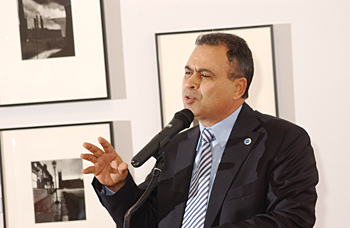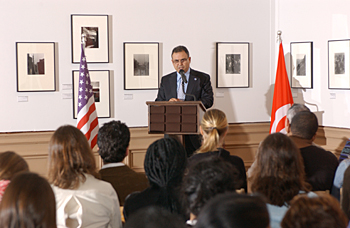The ambassador's remarks and a reception in Old College on Nov. 14 were part of activities and events in celebration of International Education Week at UD, Nov. 12-16.
Hachana began his day at UD by meeting and having lunch with UD faculty and administrators in the colleges of Business and Economics and Arts and Sciences before embarking on a tour of the Newark campus. After his lecture at Old College, Hachana had dinner with UD President Patrick Harker, Havidán Rodríguez, vice provost for academic and international programs and Lesa Griffiths, director of UD's Center for International Studies
The Center for International Studies has just signed an agreement for UD's first study abroad program with Tunisia, so Hachana also met with study-abroad students, college deans and administrators.
Rodríguez introduced Hachana, citing his 24 years as a diplomat including the position of Tunisian ambassador to the U.S., the United Arab Emirates, Lebanon and Kuwait. Rodríguez said Hachana served as a cabinet member in Tunisia's Office of the President of the Republic in the Department of Diplomat Affairs and deputy chief of mission at the Tunisian Embassy in Washington. In the 1980s, Hachana served as Tunisia's deputy director of cooperation with North American countries and the United Nations and its specialized agencies. He speaks Arabic, French, English and some Spanish, and is married with two children, Rodríguez noted.
Before beginning his official remarks, Hachana recalled the ceremony in which he presented his ambassadorial credentials to President George W. Bush. His wife and children accompanied him to the White House, he said, and, at one point, Bush asked Hachana's 9-year-old son if he spoke English. "The child looked the president straight in the eye and asked, 'Do you speak Arabic?' Without a pause, the president said, 'I can't even speak English no less Arabic,'" Hachana said.
Hachana said Tunisia and the U.S. share a common commitment to freedom, moderation, modernity and reform. Even though, the two countries seem very different, he said, “from the start the two have shared values and the same vision imbued with pragmatism and rationalism.” The U.S. stands for human dignity, the rule of law and separation of church and state while respecting all religions and the right of citizens to life liberty and the pursuit of happiness, and Tunisian leaders share those principles, Hachana said.
Throughout its 3,500-year history, Hachana said, Tunisia has been a small country with few natural resources facing strong competition from its neighbors, yet Tunisia has met these challenges and today is a success story standing as an example to the world of a forward-looking nation steeped in the best of its faith and traditions.
He said, the Islamic country is committed to openness and has been a meeting place for diverse civilizations. Because of this, Hachana said, Tunisia's deep-seated tradition of openness was never more needed than in the aftermath of 9/11, with his country rejecting the idea of a clash of civilizations and instead proposing a dialog of cultures.
Since 1965, Tunisia has urged Palestinians and Arab nations to negotiate with Israel for a Palestinian homeland, and it has paid the price, he said. In calling for negotiations with Israel, Tunisia was treated as a betrayer of the Arab world, and its embassy in Cairo was burned, he said.Despite that, in 1981, he said, Tunisia helped negotiate a truce between the Jordanian government and the Palestinians. A year later, working with the U.S., Tunisia helped with the evacuation the Palestinian Liberation Organization (PLO) from Lebanon and the establishment of a PLO headquarters in Tunis, Tunisia's capital.
“We consider the Tunisian-American relationship strategic and vital. We believe in a strong and lasting partnership with the U.S.,” Hachana said.
As for Tunisia's economy, Hachana said, it is on the rise. Tunisia will become a free trade zone with the European Union in the early part of 2008.
He said Tunisia once received $1.5 billion in financial aid from the U.S., but that has been decreasing since the early 1990s, and it's now limited to commercial loans. Hachana said Tunisia's goal is that by 2016 per capita income will double, 1 million jobs will be created and absolute poverty will be eradicated.
“We are proud of our accomplishments nevertheless we are very much aware of the challenges ahead,” Hachana said.
Article by Barbara Garrison
Photos by Duane Perry



